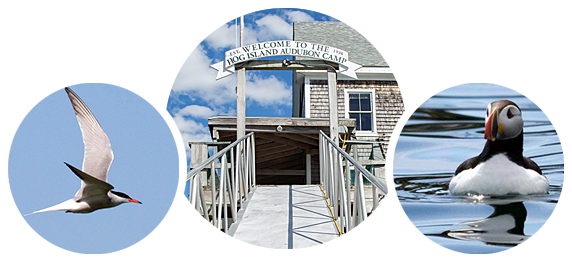This update on Hog Island planning was posted on the National Aububon website on December 7. It is reprinted with permission.

To the Friends of Hog Island and other members of the Audubon family
I want to share the following update on Audubon’s plans for Hog Island.
In brief, we’ve called time out to enable the local Friends of Hog Island to put together a business plan, including a strategy for raising an endowment that would enable Audubon to retain control over both the programming and property at Hog Island. We all know how central Hog Island is to our history – just as we know that it has been financially unsustainable because its long-time model has been eclipsed by competition and more contemporary marketing approaches.
As Maine Audubon hands Hog Island back to NAS, we are continuing to work with a top-flight education partner and camp, Kieve-Wavus Education, Inc. During this pause, we look forward to working with Friends of Hog Island to see if they can become a more integral partner in the project and can raise enough funds to support this effort.
We’re committed to making the changes needed to not lose money on the camp at Hog Island. As the public conversation progresses, I’d ask that you keep our goal in mind (and media accounts haven’t always done this): Audubon’s goals are to continue our signature programming on the Island, protect the biodiversity of the Island, and develop a financially sustainable business model for running the programs and maintaining the buildings. If all of this entails working with a partner or outsourcing the maintenance of the facilities, that would be a workable approach, in our view.
Q & A on Audubon Plans for Hog Island
Q: Will Audubon continue to own Hog Island?
A: Yes.
Q: What happens after 2011?
A. Audubon is committed to the ongoing preservation of Hog Island’s biodiversity and wilderness. And we treasure the transformational education and conservation experiences its programs have provided. However, for more than a decade, Hog Island has faced financial challenges related to running and operating residential camp programs, including increasingly high operational costs, shifting consumer travel choices, and changes in the camping industry. That said, we know that Hog Island has many passionate supporters, and we are optimistic that the Friends of Hog Island will be able to develop a sustainable business plan and obtain adequate funding support.
Q. Is there a chance that Audubon would turn over the management of the Island to Kieve-Wavus Education, Inc. or some other entity in the future?
A. At this time, we are committed to seeing if Friends of Hog Island can work with Audubon, Kieve-Wavus Education, Inc. and Maine Audubon to develop a viable business plan and raise the needed money to support the operations and programming on Hog Island. However, if that does not happen, we will continue to explore options with Kieve-Wavus Education.
Q. How long will you give Friends of Hog Island to see if they can raise the support needed?
A. We are in discussions now to determine an appropriate timeline and process.
Q. Why would you work with Kieve-Wavus Education, Inc.? What’s their reputation?
A. We conducted an assessment of potential partners in 2009 and it led us to our current discussions with Kieve-Wavus Education, Inc., a local nonprofit organization whose camps “promote the values of teamwork, kindness, respect, and environmental stewardship” for youth and adults. Audubon and Kieve-Wavus Education, Inc. have been working together informally for more than 30 years, and we have been working more closely together in the past two years. Kieve-Wavus Education, Inc. has an excellent reputation for offering high-quality active-learning educational experiences for young people for the past 85 years. A partnership with Kieve-Wavus Education, Inc. allows Audubon to reach a broader audience, including young leaders. Keive-Wavus Education, Inc. reaches more than 9,000 young people each year. By giving these young people a chance to learn, discover, and explore on Hog Island, we will be helping to build the next generation of conservation leaders. In addition, Kieve-Wavus Education, Inc. has been extremely helpful in ensuring that Audubon’s summer programming last year was successful!
Q. What is Maine Audubon’s role?
A. As mentioned above, Maine Audubon currently manages the buildings and overall upkeep, and they will be transferring those management responsibilities back to National Audubon. (They took over management of the Island in 2000.) Maine Audubon will be working with Kieve-Wavus Education, Inc. to integrate environmental education into Kieve’s programming. In addition, Maine Audubon will continue to work with Audubon to support high-quality programming on the Island.
Q. How can other supporters of Hog Island help?
A. There are many ways you can help support Hog Island.
The first is to sign up for programming. We want to make sure that all sessions are full, enabling us to meet our programming and financial goals for the season. For more information, visit http://www.projectpuffin.org/OrnithCamps.html
The second thing you can do is to provide financial support for the Island’s operations and programming. We need funding to support the operations and the development of an endowment. In addition, we need funding to support building upkeep and upgrades to allow for continued programming. If you are interested in donating to Hog Island, please visit https://loon.audubon.org/payment/donate/PUFFHOGISL.html Even small amounts can add up to make a huge difference.
And finally, you can volunteer on the Island, working with Friends of Hog Island and Audubon staff to help prepare the camp for programs.
Audubon looks forward to working with everyone who is interested in the future of Hog Island. And if you have questions, please email jbraus@audubon.org.

